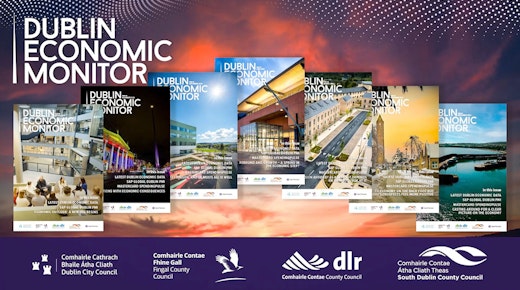As we seem to be reaching the final stages of COVID-19, it is perhaps timely to reflect on how the pandemic has been the catalyst for accelerated change across the world. The scale of disruption has led us to question how businesses operate, how consumers interact with businesses, and the potential for more flexible ways of working.
Some of these new ways of working have in turn opened up possibilities for new ways of living more sustainably and inclusively, and have the potential to enhance Ireland’s competitiveness and productivity.
Recovery in Dublin
Recovery from the pandemic is becoming increasingly evident in Dublin – with public transport carrying many more passengers, traffic jams re-emerging, shops and restaurants welcoming more customers, and increasing audiences for cinemas, theatres, and sporting events.
The latest Competitiveness Challenge published by the National Competitiveness and Productivity Council (NCPC) examined the impact of COVID-19, coming alongside other major developments, such as the transition to carbon neutrality by 2050, the digital transition, and the consequences of Brexit.
The NCPC noted that policy, at the worst stages of the pandemic, had to focus on providing broad supports for employees and businesses. For example, in May 2020 there were almost 175,000 recipients of the
Pandemic Unemployment Payment (PUP) in Dublin, whereas in January 2022, there were roughly 26,500 individuals (one third of total claims) in receipt of the PUP. As the re-opening continues, attention must now focus on supporting workers to upskill and retrain for new employment opportunities and on supporting viable businesses deal with challenges that make them vulnerable in the short term.
The economic recovery is also seeing enterprises struggle to find key skilled staff and experienced managers, with vacancy rates increasing and higher
levels of job transitioning occurring. The recent upward pressures on the price of key inputs, particularly energy, is now a key focus of government but should not distract from dealing with other major longer-term challenges.
The agility demonstrated under COVID-19 saw improvements in Dublin’s streets and parks, and in our ways of delivering public services (including in health and education) and private services that could not have been envisaged just two years ago. Indeed, the evidence in many quarters that we did not ‘waste the crisis’ should give us more confidence to tackle other major issues that have proven intractable in the past.
A Clearer Vision for the Future
As Ireland emerges from the turbulence of the pandemic, it is time for a clearer vision for the Dublin region and to determine the steps to be taken to realise that vision. This means addressing structural weaknesses that
result in businesses facing less favourable operational environments than their competitors in other capital cities across the EU and the OECD (see Our Cities: Drivers of National Competitiveness NCC (2009)).
A pinch point recognised by the NCPC in Ireland’s Competitiveness Challenge 2021 is the undersupply of new housing, resulting in chronic shortages of properties in both the rental and home ownership markets. These in turn have led to house price increases, rent increases and increased homelessness, with many households priced out of local markets.
Of course, housing is not the only vital infrastructure pressure point. Dublin has experienced bottlenecks in other critical areas such as water and waste-water, electricity, communications and transport. These infrastructure needs must be addressed in tandem with new housing and will be required to support new and expanding enterprises in the Dublin area. Investing efficiently in Ireland’s housing stock, and in the associated social and economic infrastructure, as well as in other critical infrastructure can help boost the economic recovery while also meeting specific long-term infrastructure requirements that benefit living standards.
New Ways of Working & Living
The pandemic has accelerated changes to how people live and work. There must be a focus on the attractiveness of Dublin as a place to live as well as a place to work. In delivering on the affordable housing objectives of the Government’s Housing for All Strategy, other essential services in Dublin, such as childcare, education, health and social care must also be addressed.
In delivering on the affordable housing objectives of the Government’s Housing for All Strategy, other essential services in Dublin, such as childcare, education, health and social care must also be addressed.
The impact of Covid-19 has increased awareness that we will benefit more from an economic recovery that is environmentally and economically sustainable and socially inclusive, so that Ireland’s competitiveness and productivity performance delivers for all parts of society. While the Irish welfare system and Ireland’s progressive income tax regime is effective in reducing inequality, the NCPC welcomes the establishment of the Commission on Taxation and Welfare, which will re-examine Ireland’s taxation and welfare model to ensure that it delivers for businesses and employees in the 21st century. While Dublin’s current at-risk-of-poverty rate
of 11.1% is lower than the national average of 12.8%, it will be important that low-income households and other vulnerable groups in our capital city are not left behind as the recovery continues.
While the NCPC recognises that there are many challenges ahead, there are also potential opportunities in the form of new ways of working and possibilities for new ways of living that can deliver real
improvements in the lives of people based in Ireland, with sustainability and inclusivity at the core.





